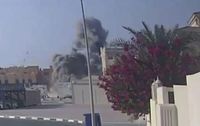Two dramatic events on September 9, 2025, have thrown the international order into turmoil, testing the credibility of U.S. President Donald Trump and shaking the fragile balance of global alliances. Within hours, the Israeli military launched a surprise strike against Hamas leaders in Doha, Qatar, and Russian drones violated Polish airspace, marking what many see as a dangerous escalation in both the Middle East and Eastern Europe. These incidents have not only raised questions about Trump’s ability to deliver on his campaign promises but have also exposed deep rifts among America’s allies and adversaries alike.
The day began with the Israeli Defense Forces (IDF) conducting an airstrike in Doha, targeting high-ranking Hamas officials allegedly involved in orchestrating the October 7, 2023 attacks on Israel and continuing military operations against the Jewish state. According to the IDF, the operation was aimed at eliminating those directly responsible for some of the bloodiest recent violence in the region. But the strike’s location—a densely populated part of Doha, home to numerous foreign diplomatic missions—immediately triggered alarm bells among the international community.
Washington, it turned out, had not been informed of the Israeli action in advance. The White House quickly acknowledged the lack of warning, while the U.S. military scrambled to alert President Trump. In an unusual move, Trump openly criticized Israeli Prime Minister Benjamin Netanyahu, long considered a close ally and friend. "We have to secure the release of the hostages. But I’m very disappointed with how everything unfolded," Trump told reporters, voicing his frustration that his special envoy to the Middle East, Steve Witkoff, was only able to warn Qatari authorities after the bombs had already begun to fall.
The diplomatic fallout was swift. Ukraine’s Ministry of Foreign Affairs condemned the Israeli strike as a "gross violation of international law" and an infringement on Qatar’s sovereignty. Kyiv expressed solidarity with Qatar, highlighting that the attack struck a state playing a vital role as mediator in the Gaza conflict. Ukraine called for an immediate end to violence and a return to peace negotiations, urging all parties to avoid actions that could derail Qatar’s mediation efforts and escalate the crisis further.
The European Commission, meanwhile, responded by suspending all financial support to Israel and freezing payments, a move that underscored the growing divide between Israel and some of its Western partners. This unprecedented step signaled the seriousness with which European leaders viewed the Israeli strike and its implications for international law and diplomatic norms.
As the world was still coming to terms with the events in Doha, news broke that 19 Russian drones had entered Polish airspace. Poland, with the assistance of NATO allies—including two F-35 jets from the Netherlands—shot down the unmanned aircraft. This marked Moscow’s first direct act of intimidation against a NATO member since the war in Ukraine erupted three and a half years ago. Polish Prime Minister Donald Tusk described the incident as "an act of aggression," while the Kremlin insisted that Warsaw was not the intended target. Belarus, Russia’s close ally, claimed the drones had simply "flown off course."
NATO Secretary General Mark Rutte minced no words, calling the drone incursion "absolutely reckless" and "absolutely dangerous." He emphasized that, intentional or not, the incident could not be dismissed as an isolated event, warning of its potential to escalate an already volatile conflict. The timing of the incursion could hardly have been more provocative, coming just a week after Polish President Karol Nawrocki’s visit to Washington, where Trump had promised to maintain a strong U.S. military presence in Poland. "We will support you at all times," Trump pledged, seeking to reassure America’s NATO allies.
But as Polish Foreign Minister Radek Sikorski pointedly remarked during a press conference in Warsaw, words alone are no longer enough. "Putin laughs at President Trump’s peace efforts," Sikorski declared. "Since Alaska, he has only escalated the war. I hope [the U.S. president] backs up his words with actions." Sikorski’s comments referred to the meeting 22 days earlier between Trump and Russian President Vladimir Putin at a military base in Anchorage, Alaska. There, Trump had accepted many of Putin’s demands as a precondition for starting talks to end the Ukraine war—a war Trump had famously promised to end on his first day in office. As of September 11, it had been 233 days since that pledge, with little sign of progress. Russia still occupies about 20% of Ukraine’s territory, and, just days before the drone incident in Poland, Moscow launched its largest missile and drone attack yet.
These military moves appear designed to test Trump’s resolve and to make clear that Putin is willing to negotiate only on his own terms. The incursion into Poland, a NATO member bound by the alliance’s Article 5 mutual defense commitment, has forced the White House to confront the limits of its diplomatic strategy and the reality that adversaries may see American restraint as an invitation to push boundaries.
Meanwhile, Trump has tried to exert economic pressure on Russia by urging European Union allies to impose tariffs of up to 100% on China and India, the two main buyers of Russian oil. According to Reuters, the plan is for the EU to act first, with Washington following suit. An EU delegation arrived in Washington to discuss coordinating these sanctions, but there is skepticism about whether such economic measures can deter further Russian escalation, especially in light of the recent drone crisis.
As for the Israeli strike in Doha, Trump has distanced himself from the decision, emphasizing that it was Netanyahu’s call. "The decision to strike Qatar was not mine, but that of Prime Minister Benjamin Netanyahu," he stated, seeking to deflect criticism amid growing international outrage. Still, critics argue that Trump’s approach—alternately tough and conciliatory—has left allies uncertain and adversaries emboldened.
Ukraine’s condemnation of the Israeli strike and its call for renewed negotiations underscore the interconnectedness of today’s global crises. With Russia’s aggression in Eastern Europe, Israel’s actions in the Middle East, and the U.S. struggling to project both strength and consistency, the world finds itself at a crossroads. The coming weeks will reveal whether Trump can translate his promises into concrete results—or whether the current turmoil will further erode America’s standing as a stabilizing force on the world stage.
As the dust settles from these twin shocks, leaders and citizens alike are left wondering: can the old order hold, or is a new, more dangerous era dawning?




